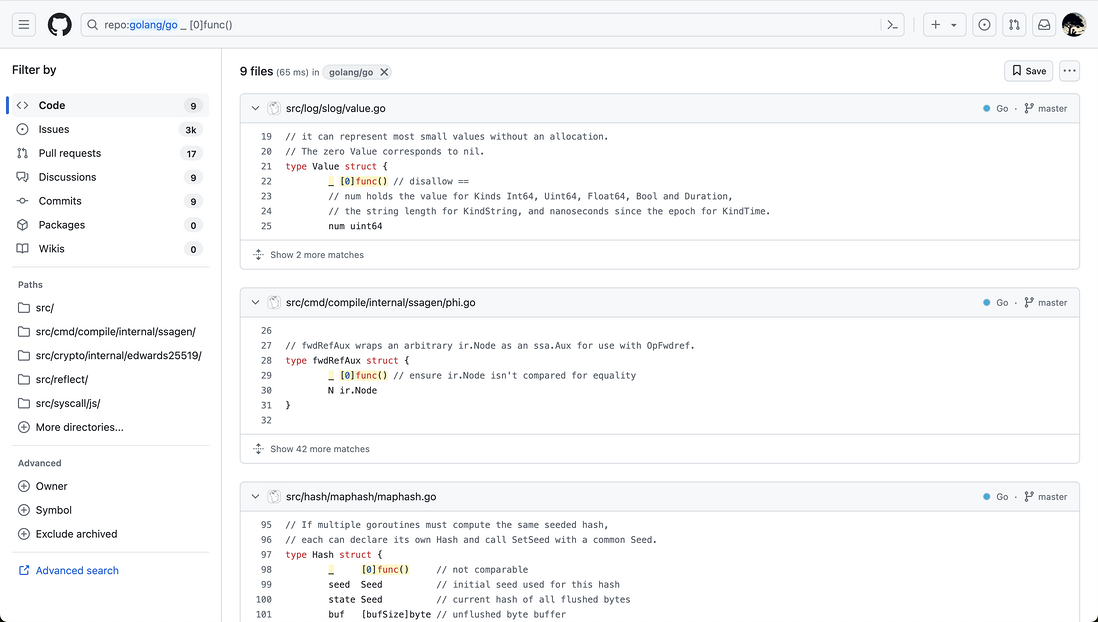最近我在使用 Go 官方出品的结构化日志包 slog 时,看到 slog.Value 源码中有一个比较好玩的小 Tips,可以限制两个结构体之间的相等性比较,本文就来跟大家分享下。
在 Go 中结构体可以比较吗?
在 Go 中结构体可以比较吗?这其实是我曾经面试过的一个问题,我们来做一个实验:
定义如下结构体:
type Normal struct { a string B int }
使用这个结构体分别声明 3 个变量 n1、n2、n3,然后进行比较:
n1 := Normal{ a: "a", B: 10, } n2 := Normal{ a: "a", B: 10, } n3 := Normal{ a: "b", B: 20, } fmt.Println(n1 == n2) fmt.Println(n1 == n3)
执行示例代码,输出结果如下:
$ go run main.go true false
可见 Normal 结构体是可以比较的。
如何让结构体不可比较?
那么所有结构体都可以比较吗?显然不是,如果都可以比较,那么 reflect.DeepEqual() 就没有存在的必要了。
定义如下结构体:
type NoCompare struct { a string B map[string]int }
使用这个结构体分别声明 2 个变量 n1、n2,然后进行比较:
n1 := NoCompare{ a: "a", B: map[string]int{ "a": 10, }, } n2 := NoCompare{ a: "a", B: map[string]int{ "a": 10, }, } fmt.Println(n1 == n2)
执行示例代码,输出结果如下:
$ go run main.go ./main.go:59:15: invalid operation: n1 == n2 (struct containing map[string]int cannot be compared)
这里程序直接报错了,并提示结构体包含了 map[string]int 类型字段,不可比较。
所以小结一下:
结构体是否可以比较,不取决于字段是否可导出,而是取决于其是否包含不可比较字段。
如果全部字段都是可比较的,那么这个结构体就是可比较的。
如果其中有一个字段不可比较,那么这个结构体就是不可比较的。
不过虽然我们不可以使用 == 对 n1、n2 进行比较,但我们可以使用 reflect.DeepEqual() 对二者进行比较:
fmt.Println(reflect.DeepEqual(n1, n2))
执行示例代码,输出结果如下:
$ go run main.go true
更优雅的做法
最近我在使用 Go 官方出品的结构化日志包 slog 时,看到 slog.Value 源码:
// A Value can represent any Go value, but unlike type any, // it can represent most small values without an allocation. // The zero Value corresponds to nil. type Value struct { _ [0]func() // disallow == // num holds the value for Kinds Int64, Uint64, Float64, Bool and Duration, // the string length for KindString, and nanoseconds since the epoch for KindTime. num uint64 // If any is of type Kind, then the value is in num as described above. // If any is of type *time.Location, then the Kind is Time and time.Time value // can be constructed from the Unix nanos in num and the location (monotonic time // is not preserved). // If any is of type stringptr, then the Kind is String and the string value // consists of the length in num and the pointer in any. // Otherwise, the Kind is Any and any is the value. // (This implies that Attrs cannot store values of type Kind, *time.Location // or stringptr.) any any }
可以发现,这里有一个匿名字段 _ [0]func(),并且注释写着 // disallow ==。
_ [0]func() 的目的显然是为了禁止比较。
我们来实验一下,_ [0]func() 是否能够实现禁止结构体相等性比较:
v1 := Value{ num: 1, any: 2, } v2 := Value{ num: 1, any: 2, } fmt.Println(v1 == v2)
执行示例代码,输出结果如下:
$ go run main.go ./main.go:109:15: invalid operation: v1 == v2 (struct containing [0]func() cannot be compared)
可以发现,的确有效。因为 func() 是一个函数,而函数在 Go 中是不可比较的。
既然使用 map[string]int 和 _ [0]func() 都能实现禁止结构体相等性比较,那么我为什么说 _ [0]func() 是更优雅的做法呢?
_ [0]func() 有着比其他实现方式更优的特点:
它不占内存空间!
使用匿名字段 _ 语义也更强。
而且,我们直接去 Go 源码里搜索,能够发现其实 Go 本身也在多处使用了这种用法:

所以推荐使用 _ [0]func() 来实现禁用结构体相等性比较。
不过值得注意 的是:当使用 _ [0]func() 时,不要把它放在结构体最后一个字段,推荐放在第一个字段 。这与结构体内存对齐 有关,我在《Go 中空结构体惯用法,我帮你总结全了!》 一文中也有提及。
NOTE: 对于
_ [0]func()不占用内存空间的验证,就交给你自己去实验了。
提示:可以使用fmt.Println(unsafe.Sizeof(v1), unsafe.Sizeof(v2))分别打印结构体Value的两个实例v1、v2的内存大小。你可以删掉_ [0]func()字段再试一试。
总结
好了,在 Go 中如何让结构体不可比较这个小 Tips 就分享给大家了,还是比较有意思的。
前端的世界总是在不断变化,作为开发者,我们需要保持好奇心和学习热情,不断探索新的技术,只有这样,我们才能在这个快速发展的时代中立于不败之地。低代码也是一个值得我们深入探索的领域,让我们拭目以待,它将给前端世界带来怎样的变革。
介绍一款程序员都应该知道的软件JNPF快速开发平台,很多人都尝试用过它,它是功能的集大成者,任何信息化系统都可以基于它开发出来。
JNPF可以实现应用从创建、配置、开发、测试到发布、运维、升级等完整生命周期的管理。减少了传统应用程序的代码编写量,通过图形化、可视化的界面,以拖放组件的方式,即可快速生成应用程序的产品,大幅降低了开发企业管理类软件的难度。
希望这篇文章对你有所帮助~